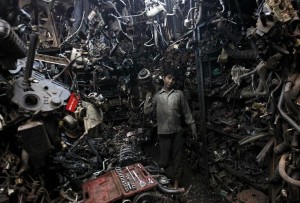A known and hospitable place. I think that for the most part this is the image we have of the assembly. We read in a journal or on a poster that there is a meeting, a debate, and we find ourselves seated, almost always in a circle (perhaps in homage to the Enlightenment idea of “Encyclopedia”, that really means circular learning), waiting for someone to introduce and elucidate the topic for us. If the theme of the discussion is specific enough, we are convinced that expertise is required and so participation is quite limited. On the other hand, if it is a bit broader and more complex, everyone has her say without any deference. And yet in the end, one always remains a bit frustrated.
Continue reading Like a Church – Massimo Passamani
Tag Archives: Cane Nero
Streamlined Production
(from Cane Nero)
Alfredo M. Bonanno
Among the various characteristics of the last several years, the failure of global automation in the factories (understood in strict sense) must be pointed out, a failure caused by the failure of the prospects and, if you will, the dreams of mass production.
Continue reading Streamlined Production
The Obscure Clarity of Words
Alfredo M. Bonanno.
(from Cane Nero)
One who writes, perhaps even more than one who speaks, is called to clarify, to bring light. A problem is posed – the problem of something the one who writes should be concerned with since otherwise his respect would be deprived of meaning. This problem is illuminated by the use of words, by a specific use, capable of being organized within the shell of certain rules and in view of a perspective to be attained.
Continue reading The Obscure Clarity of Words
The Reverse Road
Alfredo M. Bonanno
Times of doubt and uncertainty have arrived. New and old fears spur the search for guarantees. In the market where human affairs are managed, new models of comfort are briskly haggled over. Madonnas weep, politicians make promises; everywhere war and misery, savagery and horror are rife, rendering us now unable to even feel outrage, let alone to rebel.
Continue reading The Reverse Road
ENGLISH, OR ALMOST SELF-MANAGEMENT
The points that follow are addressed to the part of the movement for self-management that claims to exist within the anarchist movement. Personally, I do not believe that it exists at all. In fact, in areas where traces of an embryo of it might seem to exist, they turn out to be quite the opposite. Of course, this could be considered to be quite an arbitrary assumption, but a moment of reflection should help to clarify the matter.
It is not enough for anarchists to build some kind of structure, be it a squat, a libertarian school, an alternative bank, or a food or services coop, for the latter to be considered self-managed.
Continue reading ENGLISH, OR ALMOST SELF-MANAGEMENT
LA MATERIALIT’ DEL COMANDO: CONSENSO, LEGITTIMAZIONE E COERCIZIONE
Massimo Passamani.
Molti degli equivoci a proposito della gestione democratica del potere nascono, a mio avviso, dall’ambiguita’ del concetto di consenso. Un ragionamento ormai diffuso tra un buon numero di anarchici e’ quello che segue.
Continue reading LA MATERIALIT’ DEL COMANDO: CONSENSO, LEGITTIMAZIONE E COERCIZIONE
Freedom’s Disorder
Massimo Passamani
The state is the supreme expression of institutional order. It is a model of social organization built on hierarchy, control and coercion. According to one view that many anarchists share, institutional order is nothing other than the usurpation of another kind of order that could be described as spontaneous.
Continue reading Freedom’s Disorder
The Two Faces of the Present (en/fr)
Massimo Passamani
« One cannot enter twice into the same river »—Heracleitus
« What’s new? There’s Clio »—A Renault advertisement
Continue reading The Two Faces of the Present (en/fr)
UN FANTASMA IN GALLERIA
Alfredo Maria Bonanno
Galleria Vittorio Emanuele, una notte del novembre 1994, a Milano. Le ricchezze solidificate in buona pietra scura, riposano tranquille.
Continue reading UN FANTASMA IN GALLERIA
Children’s Thoughts
by Massimo Passamani
Yes, I know, we are all against axioms, guarantees, certainties.
But can we really live without sharing our being against—without depending upon this sharing?
The search for identity is not always oriented toward the mass, toward the great crowds of followers. Even the small group can become our safe space. What’s more, the very refusal of every group and of any form of membership can construct its own arrogant, solitary radicality through the play of recognition.
My stubborn solitude is fed by what it opposes; it even—or maybe, above all—feeds on criticisms.
Continue reading Children’s Thoughts









